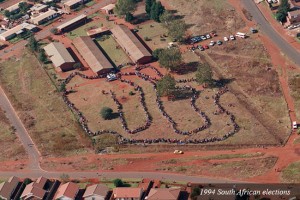We bumped into our host this afternoon and filled him in on what we’ve been up to since we saw him on Sunday morning. He was gobsmacked when we told him that we had travelled on a suburban train – none of his other guests has ever done that … in fact, he has never caught a train in his own city. He’ll probably dine out on his ‘crazy, stupid Australians’ story for months. But we were completely safe in that train, no one gave us a second glance. Wouldn’t do it late at night or in the early hours of the morning, but then I wouldn’t do it at home either. And now I think about it, I’ve never actually caught a train in Adelaide.
The Hop On, Hop Off bus worked well for us today. We really only wanted to use it to get to the Apartheid Museum, but they had a commentary running that could be accessed via headphones and we learnt a lot about the city and its history as we drove along, and we got to see a lot more of the city, without Greg having to deal with the crazy busy traffic, pedestrians and non-working traffic lights.
Jozi was originally founded because it had the world’s largest gold deposit running beneath it. It’s world’s largest city not situated on a river, lake or coastline. Just having heaps of gold was apparently enough of a reason, although the orginal founders (several guy called Johannes, plus a few others) didn’t expect the settlement to last. Cheap, black labour was brought in to mine the gold … and that indirecly lead to segregation and to the Apartheid policy being implemented in the late 1940s. I don’t need to write any more about apartheid – there are already millions of words written about it, but I’ll tell you about what we saw, and how the museum made me feel.
When we bought our tickets, we were allocated to be ‘white’ or ‘non-white’ and entered the museum through separate doors depending on the colour of our skin. All of the museum is very well done, it traces the history of South Africa and features biographies of early prominent citizens, including Mohondas ‘Mahatma’ Ghandi who lived in South Africa for 21 years, from 1893–1914. His experiences of discrimination, racism & injustice in this country influenced the rest of his life.
The tour through the museum took us through the timeline of segregation to apartheid, life under apartheid in the 1960s, political executions, uprisings, the fight for freedom, Mandela’s release on this day 25 years ago, February 11th, 1990, the violence of the early 1990s, the transition to democracy, the 1994 election and beyond. Lots of photos, videos, mementos and other items on display.
I spent most of my time there with tears in my eyes and a lump in my throat. It is incomprehensible that people could be cruel to other people because of the colour of their skin AND that there were laws allowing such cruelty to occur, for decades. 2 images from the museum are imprinted in my memory – the nooses hanging from the ceiling in the Political executions room, which listed the names of hundreds of people detained without trial and subsequently killed, although officially many of them ‘committed suicide by hanging’.
The other image is an aerial shot of a long, long line of people queuing to vote in the 1994 election. I couldn’t find that photo, but there are plenty more on the internet, the one below is from the Australian Electoral Commission website. The ballot papers listed the political parties, with a photo of the party’s candidate rather than their name, beside each party.
The museum was confronting, heartbreaking, optimistic for the future and definitely well worth visiting. I’m glad we got there on our third attempt.
While we were waiting for the bus this morning, we chatted with the tour guide, a young man who was born at the Chris Hani-Baragwanath Hospital in Soweto and lives in one of the townships, Orlando, which is where Nelson Mandela and Desmond Tutu also lived. His family is from near Louis Trichard in the Limpopo province in the north-east of the country, and he was excited to hear that we had been there. He speaks 8 languages! He was aghast when we told thim that a house in our street had recently sold for almost $1 million. Housing here is much cheaper, but then, housing in most places in the world is much cheaper than in Australia.
It’s my birthday today, so let’s celebrate with a song that will get your toes tapping. Its origins are South African township music.
